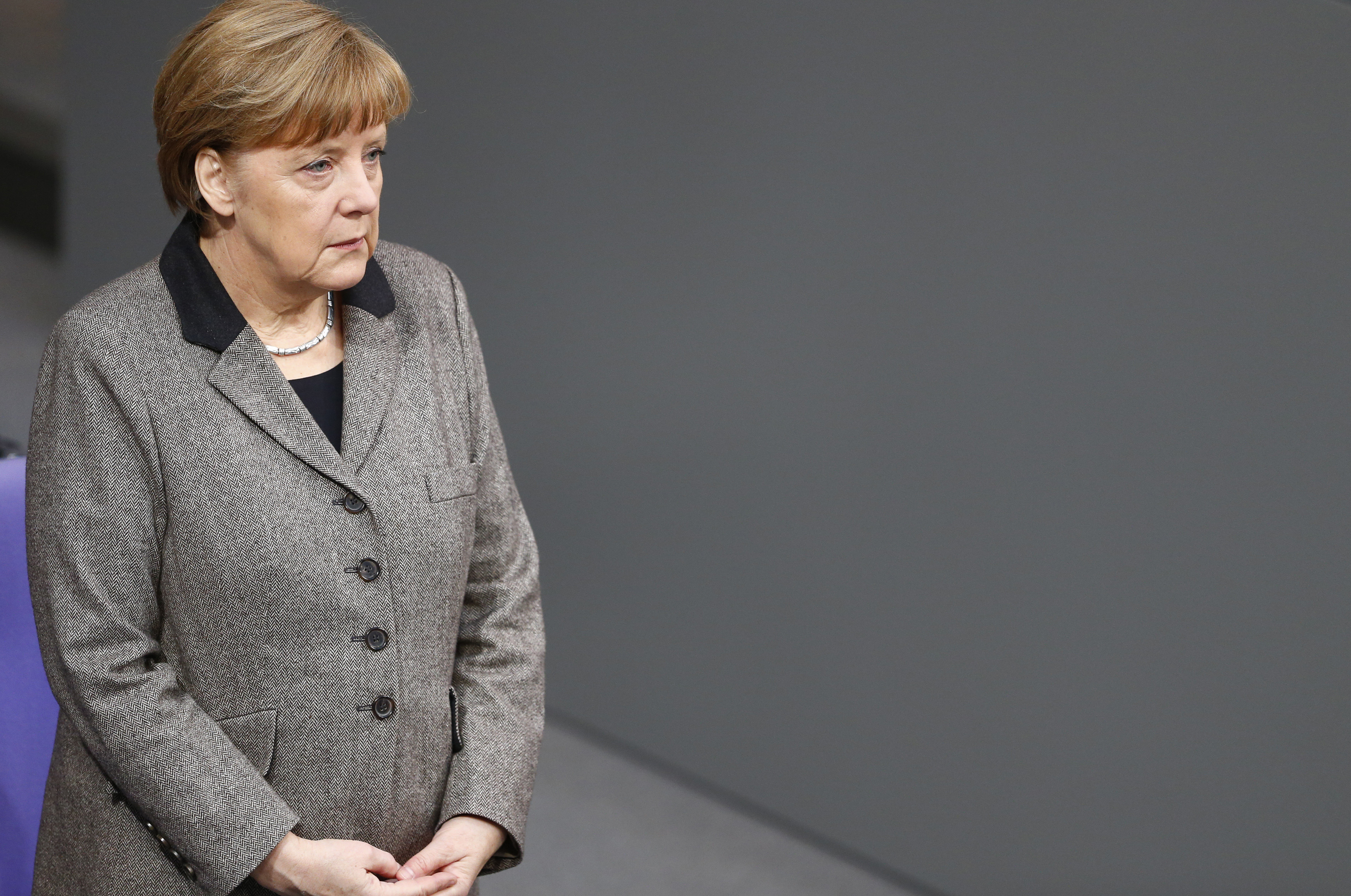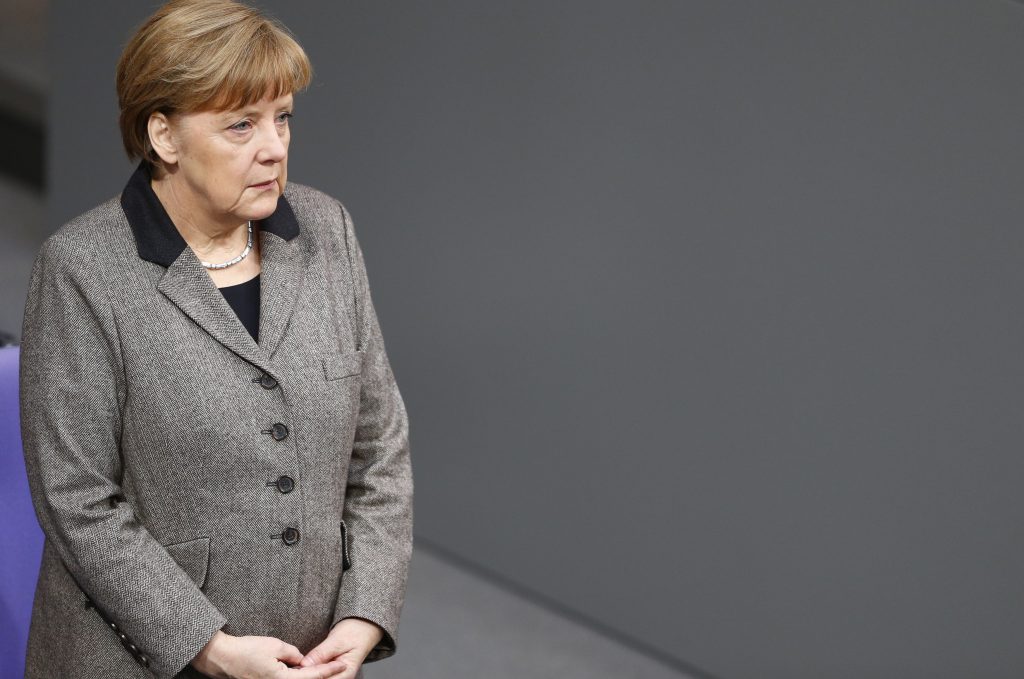
Chancellor is vital for European solidarity on Russia sanctions, says Atlantic Council’s Fran Burwell
If German Chancellor Angela Merkel were to step down from her role it would create uncertainty over the fate of sanctions imposed on Russia in response to its actions in Ukraine, according to Fran Burwell, a distinguished fellow at the Atlantic Council.
“There is one area where her absence would make a great deal of difference potentially and that is on the sanctions on Russia,” said Burwell.
“With the British leaving [the European Union] and her leaving—if she should leave—that makes the continued adherence to these sanctions less certain. Depending on what happens in the Italian elections, those sanctions could be vulnerable indeed,” she added.
Moreover, Burwell noted, instability in Germany would be a blow for the European Union (EU), which is grappling with the United Kingdom’s decision to exit the Union and the eurozone crisis.
Merkel faced the biggest crisis of her twelve-year political career on November 20 as negotiations to build a ruling coalition collapsed. The liberal Free Democratic Party (FDP) pulled out of talks with Merkel’s Christian Democratic Union/Christian Socialist Union (CDU/CSU) bloc and the Greens.
The unexpected development put a question mark over the chancellor’s political future and heightened the possibility of a fresh round of elections. Merkel, who has refused to step down,
said she would prefer fresh elections to leading a minority government. How her party will fare is an open question.
“In Europe, this is pretty bad timing for a lengthy political crisis in Germany,” said Burwell of the crisis in Germany. “Europe has some decisions to make about Brexit and eurozone reform. These decisions need to be seen as very legitimate. One thing Merkel brings to the table is a lot of German influence, but also legitimacy. She is seen as someone who has the interests of Europe and Germany at heart,” she added.
Fran Burwell spoke in an interview with the New Atlanticist’s Ashish Kumar Sen. Here are excerpts from our interview.
Q: Why did the coalition talks fail?
Burwell: There were a number of issues that were sticking points.
On immigration, there was a distance between the coalition negotiators over family reunification with the FDP being more reluctant to allow reunification for fear of more migrants and the Greens being more positive.
The FDP also wanted to get rid of the so-called solidarity tax, which has since 1991 been used to rebuild eastern Germany. The other parties in the coalition talks were less enthusiastic. The CDU wanted to remove it gradually and the Greens wanted to keep it for a while longer.
The Greens wanted to get rid of coal-fired power plants, but the CDU and the FDP didn’t want to do so.
On a lot of these issues, the FDP, which is the one that left the negotiations, is not the outlier; it was often the Greens. The Greens were continuing to negotiate and have accused the FDP of not being having their heart in the negotiations.
While there has been a lot of attention given to the issues as being something that broke down the talks, I think it was politics. The last time the FDP went into a coalition with Merkel they found out that it is a high-risk strategy. You go in strong and you come out and get clobbered in the polls. So perhaps the FDP was not as committed to the success of the negotiations as was needed.
Q: What are Germany’s options?
Burwell: Germany doesn’t have a whole lot of good options. Most of the options look to a weakened German government and Germany focused on continuing to try and put a government together probably until April, maybe even May. It is possible that after a day or two of rethinking the coalition negotiations will start again. It is also possible that Chancellor Merkel could decide to try and run a minority government. She would then have to, on a bunch of different issues, get an agreement issue by issue, legislation by legislation from the Greens, the FDP, [or] whoever is quite like her on a particular issue.
Another option is that this minority government doesn’t work, nor do coalition negotiations restart, and there is a complicated process by which [German] President [Frank-Walter] Steinmeier proposes a chancellor, the Bundestag doesn’t accept the chancellor, and eventually after a certain amount of time the president calls for new elections. So, there is the possibility of new elections.
Q: What does this mean for Chancellor Merkel? Will she have to resign to enable the CDU/CSU to govern with any of the other parties?
Burwell: Not necessarily because none of the parties have made her an issue. Although there has been a lot of discussion that this may be the end of her reign of the CDU, she is more popular with the public than is her party.
If I were a CDU politician and I was thinking about launching a coup against the chancellor, I would wonder whether if in an election it would help me or hurt the party. I think it would hurt the party.
She has been chancellor for a long time and it may be that this is enough for her. If she resigns it will be because she has decided she has had enough. Some others in her party may want to have their turn, but it is also true that there are no obvious successors to her in the CDU. There is no crown prince or crown princess waiting.
Q: What would a fresh election mean for Germany? Could the far-right Alternative for Germany (AfD) do better?
Burwell: That is a really open question. Most of the analysis has indicated that people think that the AfD will do better and the CDU will do worse. German politics over the years has been all about consensus and compromise. It has been about stability. A number of people voted for AfD to send a message to the chancellor that they disapproved, particularly of her immigration policy and that they were quite uncertain about how things were going. I think she has taken that message on board.
Sometimes electorates act out. They have to express their dissatisfaction with the current government, especially if it has been in power for a long time, which she has been. But then sometimes if they walk to the brink and they see what happened in that election and are faced with continuing uncertainty, they go back to the stability that they know.
I wouldn’t be surprised if the chancellor turns out to be in a pretty good position if there is a new election.
Q: What are the implications of instability in Germany for Europe and the transatlantic relationship?
Burwell: The big factor of instability in the transatlantic relationship right now is [US] President [Donald J.] Trump. He does not have a particularly close relationship with Chancellor Merkel and doesn’t look to her, unlike [former US President Barack] Obama, to keep Europe moving forward and to be his main communicator in Europe. If anyone, [French President Emmanuel] Macron has taken on that role, but it is not clear to me that anyone has.
There is one area where her absence would make a great deal of difference potentially and that is on the sanctions on Russia. With the British leaving and her leaving—if she should leave—that makes the continued adherence to these sanctions less certain. Depending on what happens in the Italian elections, those sanctions could be vulnerable indeed.
In Europe, this is pretty bad timing for a lengthy political crisis in Germany. Europe has some decisions to make about Brexit and eurozone reform. These decisions need to be seen as very legitimate. One thing Merkel brings to the table is a lot of German influence, but also legitimacy. She is seen as someone who has the interests of Europe and Germany at heart.
If we want, for example, Brexit to be seen as not as punishing the United Kingdom, but as trying to reach an agreement that is fair for the British but doesn’t give them a better deal than anyone who is in the Union, her credibility has been key to keeping everyone on board and also getting through to the British that they have to make certain decisions.
Ashish Kumar Sen is deputy director of communications at the Atlantic Council. Follow him on Twitter @AshishSen.
Image: "Well-informed observers credit German Chancellor Angela Merkel (above) and European Council President Donald Tusk of Poland with ... convincing EU leaders to extend sanctions" on Russia, writes John E. Herbst, Director of the Atlantic Council's Dinu Patriciu Eurasia Center. (Reuters/Hannibal Hanschke)
